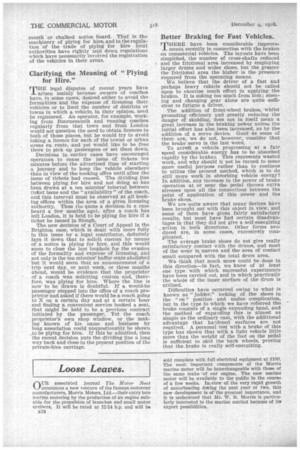Clarifying the Meaning of "Plying for Hire."
Page 2

If you've noticed an error in this article please click here to report it so we can fix it.
MHE legal disputes of recent years have -L arisen mainly because owners of coaches have, in some cases', desired either to avoid the formalities and the expense of licensing their vehicles or to limit the number of districts or towns in which a vehicle, in their opinion, need be registered. An operator, for example, working from Bournemouth and running coaches regularly from that town and from London would not question the need to obtain licences in both of those places, but he would try to avoid taking a licence for each of the towns or urban areas en route, and yet would like to be free there to pick• up passengers or set them down. Decisions in earlier cases have encouraged operators to cease the issue of tickets ten minutes before the advertised time of starting a journey and to keep the vehicle elsewhere than in view of the booking office until after the issue of tickets had ceased. The dividing line between plying for hire and not doing so has been drawn at a ten minutes' interval between ticket issue and the " availability " of the coach, and this interval must be observed at all book. ing offices within the area of a given licensing authority. Thus (to quote a decision in a case heard a few months ago), after a coach has left London, it is held to be plying for hire if a ticket be issued in Slough. The new decision of a Court of Appeal in the Brighton case, which is dealt with more fully in this issue by a legal contributor, definitely lays it down that to solicit custom by means of a notice is plying for hire, and this would seem to close the last loophole for the evasion of the formality and expense of licensing, and not only is the ten minutes' buffer state abolished but it would seem that an announcement of a trip next day, or next week, or three months ahead, would be evidence that the proprietor of a coach was soliciting custom and, therefore, was plying for hire. Where the line is now to be drawn is doubtful. If a would-be passenger stepped Into the office of a coach proprietor and asked if there would be a coach going to X on a certain day and at a certain hour and finding a convenient service hooked a seat, that might he held to be a previous contract initiated by the passenger. Yet the coach proprietor's own shop window, or the making known of his name and business by long association could unquestionably be shown to be plying for hire. If this be admitted, then the recent decision puts the dividing line a long way back and close to the present position of the private-hire carriage.






























